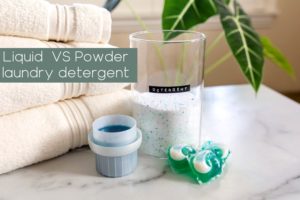
If washing the clothes in the house is your job, you want to get a laundry detergent strong enough to get rid of soiling, stains, and dirt. With the help of water and your washing machine’s cycle, a good detergent will be able to do all this. When it comes to cost, convenience, and performance they are not all the same. The main two types are liquid and powder laundry detergents and both are suitable for all top and front-loading washing machines, whether they are high-efficiency or not.
In this article, we will break down the main differences between the two types of laundry detergent for you. Keep reading to find out what they are and choose what works for you.
Powder detergent is slightly cheaper – Apart from the product itself being slightly cheaper, the lightweight cardboard packaging causes it to have lower transportation costs as well. In general, you may save a couple of pounds just by switching to powder.
Powder detergent is more efficient for mud stains, while liquid detergent is great for grease stains – Powder laundry detergents are generally more effective when it comes to cleaning blood, mud, and grass stains. That makes it perfect for athletic and sportswear. On the other hand, alcohol ethoxylates in liquid laundry detergent are great for breaking down grease and oil stains. It is great for cleaning cooking stains, or such from car oil or grease, making liquid detergents great for everyday use.
Liquid laundry detergent is better for pre-treating stains
Whenever you have a stubborn stain, it is best if you pre-treat it before throwing it in the washing machine. That will help break down the soil making the stain visible and the washing machine will have a higher chance of completely removing it from your garment. While spot treatment is possible with powder detergent, you will have to mix it into a paste first, then apply it to the stained area. Some manufacturers advise using liquid detergent when pretreating clothes and powder detergent for a deeper clean.
Liquid laundry detergent is generally easier to transport
It comes in bottles with twist-on caps that also work as measuring cups while powder detergents come in cardboard boxes that make things messier. The main reason is the need to pour the powder into a separate measuring cup, then into the washing machine, which causes spills. Nowadays liquid laundry detergents also come in pods that are pre-packaged in single doses. They contain concentrated detergent and dissolve during the cycle of your washing machine. Those are great for busy people that could use a little package to just throw in their machine.
Liquid laundry detergents leave less residue on clothes
Both types have an ingredient that actively distributes their ingredients. The primary filler in liquid detergent is water and it makes it much easier to dissolve at all temperatures. That is important since the more your detergent dissolves in water, the deeper it cleans and it is less likely for it to leave residue all over your clothes and washing machine. In the meantime, powder detergents get their granulated texture from the filler sodium sulphate. That makes them harder to dissolve, especially in cold water. Powder detergents are much more likely to leave residue on your clothes, and cause buildup inside your washing machine.
If you wash your clothes in cold water to prevent colour from fading, you may want to switch to liquid detergent.
Liquid laundry detergent is safer for your appliance
Undissolved powder detergent may cause clogging, as well as buildup on the inside of your washing machine. Powder detergent residue may block the drain pump or hose of your washing machine, causing the need for a plumber. What is more, the filler in powder detergent may react with liquids in your septic system and turn them into solids. Those may also cause clogging. If you are worried about such issues, make sure your detergent says ‘’safe for septic systems’’.
The fact that liquid detergent dissolves better in water makes it safer for use. It is less likely to clog your septic systems or cause buildup inside your washer.
However, if you use a lot of detergents, even if it is liquid, you may end up causing buildup anyways. To prevent this from happening, do not exceed the recommended amount of detergent per load. That way, you will reduce the risk of residue on your clothing as well.
Generally, both types of detergents are good and efficient in cleaning. You should choose depending on the type of clothes you wash, as well as the stains you usually get on them. Always match your detergents to the materials and colours of garments you use them for, as well as the type of machine that you have.
